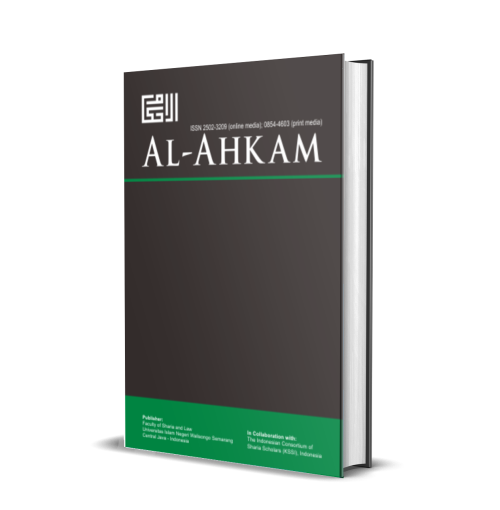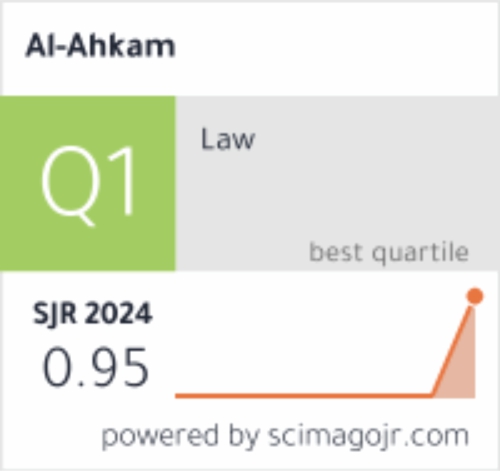Hukum Islam dan Patronase dalam Penentuan 1 Ramadhan di Bungong Keumang
DOI:
https://doi.org/10.21580/ahkam.2018.18.2.3086Keywords:
hukum Islam, patronase, arena, RamadhanAbstract
In 2017, people in Bungong Keumang village started fasting on Thursday, and they did not follow the government's decision to start fasting on Saturday. They prefer to follow the decisions of religious leaders who often overtake fasting, up to 2-3 days. This difference with the government has been going on for a long time, and almost every year has happened. This paper answers the question of why people in Bungong Keumang prefer to follow the decisions of religious leaders in starting Ramadhan fasting rather than following government decision? With in-depth interviews, answers were obtained that the choice of the community was more due to longstanding social patronage relations based on the exchange of values between religious leaders (patrons) and worshipers (clients) that are mutually beneficial to each other. The determination of 1 Ramadhan which is an area of Islamic law is an 'important arena' to strengthen patronage relations. However, at present the client's obedience to patrons is also shifting. The community is increasingly rational in making choices, access to information is also getting easier, and power relations are also decreasing, so the determination of 1 Ramadhan will become stronger into the area of astronomy and Islamic law.
Downloads
References
Ahimsa-Putra, Heddy Shri. Patron dan Klien di Sulawesi Selatan: Sebuah Kajian Fungsional Struktural. Yogyakarta: Kepel, 2007.
Alam, Abu Marsyul. “Wawancara.” 23 Agustus 2017.
Bourdieu, Pierre. Outline of a Theory of Practice - Pierre Bourdieu - Google Buku. Cambridge: Cambridge University Press, 1977.
Darmin. “Wawancara.” 24 Agustus 2017.
Daud, Sammina. Abu Habib Muda Seunagan Thariqat Syattariyah. Jakarta: Karya Sukses Sentosa, 2008.
Hakim, Tgk. Said Jamalul. “Wawancara.” 26 Januari 2017.
Ihsan, Sehat. Abu Habib Muda Seuagan Republiken Sejati dari Aceh. Banda Aceh: Bandar Publishing, 2015.
Jenkins, Richard. Pierre Bourdieu. London: Routledge, 1992.
Maksin, Tgk. “Wawancara.” 23 Agustus 2017.
Nurhadi, Agus. “Patronase Kyai Pembimbing KBHI dan Jama’ahnya.” agusnurhadi2010.wordpress.com, 2011. https://agusnurhadi2010.wordpress.com/2011/09/21/patronase-kyai-pembimbing-kbih-dan-jama’ahnya/.
Parsons, Talcott. From Max Weber: Essays in Sociology. Edited by H. H. Gerth and C. Wright Mills. New York: Oxford University Press, 1947.
Pertiwi, Asih. “Metode Penentuan Awal Akhir Ramadhan Menurut Tarekat Syattariyah di Desa Peuleukung Kecamatan Seunagan Timur Kabupaten Nagan Raya Aceh.” Skripsi. Universitas Islam Negeri Walisongo, 2017. http://eprints.walisongo.ac.id/7788/.
Prasetijo, Adi. “Hubungan Patron Klien.” Etnobudaya.net, 2008. dalam https://etnobudaya.net/2008/07/31/hubungan-patron-klien/.
Ramli, Muhammad. “Patronase Politik dalam Demokrasi Lokal (Analisis terhadap Terpilihnya Hj. Marniwati pada Pemilukades di Desa Jojjolo Kecamatan Bulukumpa Kabupaten Bulukumba).” Skripsi. Universitas Islam Negeri Alauddin Makassar, 2016. http://repositori.uin-alauddin.ac.id/1679/.
Scott, James C. “Patron-Client Politics and Political Change in Southeast Asia.” American Political Science Review 66, no. 1 (March 1, 1972): 91–113. https://doi.org/10.2307/1959280.
Tim Liputan. “Warga Nagan Mulai Puasa.” Harian Rakyat Aceh. Diakses pada 27 Juli 2017. https://harianrakyataceh.com/2017/05/29/warga-nagan-mulai-puasa/.
Downloads
Published
How to Cite
Issue
Section
License
By submitting an article to the journal, the author(s) agree to transfer the published article's copyright to the journal, which will act as the publisher. This means the journal will have the right to publish the article in various forms, including reprints. The journal will maintain the publishing rights to the published articles.
In line with the license, authors and third parties (readers, researchers, and others) are allowed to share and adapt the material. In addition, the material must be given appropriate credit, provided with a link to the license, and indicated if changes were made. If authors remix, transform or build upon the material, authors must distribute their contributions under the same license as the original.




